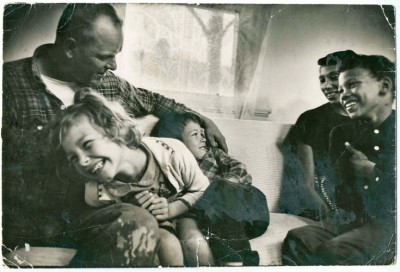| Reviews & Columns |
|
Reviews DVD TV on DVD Blu-ray 4K UHD International DVDs In Theaters Reviews by Studio Video Games Features Collector Series DVDs Easter Egg Database Interviews DVD Talk Radio Feature Articles Columns Anime Talk DVD Savant Horror DVDs The M.O.D. Squad Art House HD Talk Silent DVD
|
DVD Talk Forum |
|
|
| Resources |
|
DVD Price Search Customer Service #'s RCE Info Links |
|
Columns
|
|
|
Loving Story, The

Reviewed at the 2011 Tribeca Film Festival
The documentary format has taken on so many frills and trills over the past few years that it's almost a surprise to see one that operates in such a straight-forward fashion as The Loving Story, which basically bounces back and forth between archival footage and modern talking heads. It's not a terribly innovative or particularly exhilarating way to make a documentary these days; at times, it plays more like an episode of PBS's American Experience than a feature film. Then again, American Experience is an awfully good show--and Nancy Buirski has made a fine film. It may not blow your hair back, but it tells an important story simply and effectively.
It concerns Richard and Mildred Loving, a Virginia couple who married in Washington D.C. in 1958. He was white; she was "colored." At the time, 21 states across the country prohibited "mixed marriage," and Virginia was one of them, so the couple was arrested for daring to share a home and convicted on felony charges. They were sentenced to a year in jail, but that sentence was suspended--if they agreed to leave the state.
The thing was, they didn't want to leave the state. They liked living in Virginia; it was where their families were. And this is what, from our distance, is perhaps most interesting about the Lovings--they weren't activists. They were just plain-spoken folks who fell in love and wanted to be together. "If it's necessary," Richard says, "I'll leave again and take her. I'm not gonna divorce her."
Much of The Loving Story is comprised of intimate black and white archival footage, apparently shot at the time for television or documentary purposes, in a Mayseles-esque "direct cinema" style that observes the couple interacting with each other, with their children, with their lawyers. That footage is augmented by newer interviews with their children, lawyers, classmates, friends, neighbors, and relatives. Intermingling those elements, Buirski deftly establishes their environment: who was who, how things were done, the specific mood of that time and place.
Their story went from the local to national stage when Mildred's cousin advised her to write to Robert Kennedy--"that's what he's up there for." Kennedy directed the Lovings to the ACLU, who took on the case and ended up appealing the decision all the way to the Supreme Court. Within the construct of the case, the film looks deeper into the history of miscegenation laws: the movement of "racial classification" in the Southern states during the Reconstruction, Virginia's Racial Integrity Act of 1924, all methods of segregation aimed at preventing racial "mixing"--which, as Mailer surmised, was much of what the racism of the time was a reaction to. "The Loving case, being about love and being about sex, is actually what segregation was about all along," notes Edward Ayers of the University of Richmond. And there are plenty of voices from the time on hand to espouse those fears. Virginia Governor James Lindsay Almond, Jr., brutish citizens interviewed on the street, a Klansman--they all basically say the same thing, albeit at differing volumes.
Some of the film's editorial choices are pretty obvious (cutting from a man-on-the-street raising the specter of a "mongrel race" to Birth of a Nation, for example), and the film is, as mentioned, a little dry; it's a by-the-book effort, more an act of anthropology than cinema. But the footage that is uncovered and the tapes that are played (including an audio recording of the oral arguments before the Supreme Court) are of such high value, one doesn't mind how safe the filmmaking is. The Loving Story is easy to think of as ancient history, as a chapter in our past, and the film mostly plays like that. But it ends with startling titles, informing us that, although the Supreme Court ruling overturned the remaining bans on interracial marriage in 16 states, many of them held out. The last one was Alabama. They finally amended the anti-miscegenation language in their state Constitution a mere eleven years ago. Maybe we're not so far from this story after all.
Jason lives in New York. He holds an MA in Cultural Reporting and Criticism from NYU.
|
| Popular Reviews |
| Sponsored Links |
|
|
| Sponsored Links |
|
|
| Release List | Reviews | Shop | Newsletter | Forum | DVD Giveaways | Blu-Ray | Advertise |
|
Copyright 2024 DVDTalk.com All Rights Reserved. Legal Info, Privacy Policy, Terms of Use,
Manage Preferences,
Your Privacy Choices | |||||||










